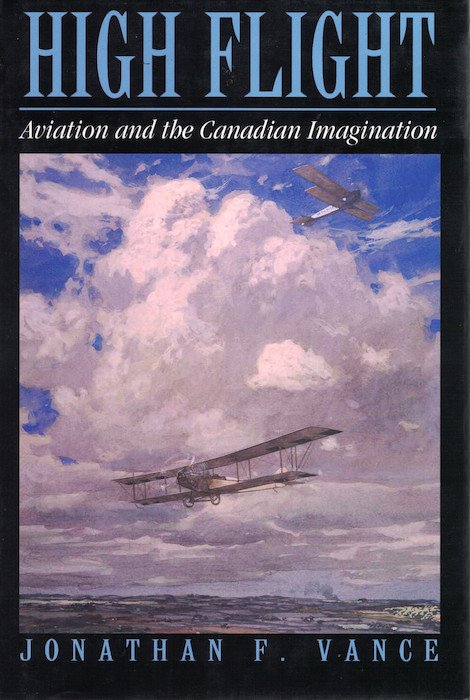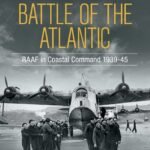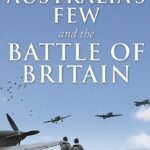
2023 will mark 120 years since the first controlled heavier than air flight, and 240 years since the first more or less controlled lighter than air flight. Much more importantly, it’s also the year in which I am going to get my ever-growing stack of to-be-read aviation history books under control! I can’t promise that I will only read aviation history books this year, but I will mostly. And in the spirit of accountability (as well as content generation), I’m going to list and reflect on what I read here on Airminded (apart from what I’m reading for strictly research purposes, anyway). Starting now…
Cooper, Anthony. Darwin Spitfires: The Real Battle for Australia. Anniversary edition. Sydney: NewSouth, 2022. I picked this up partly out of curiosity as to why NewSouth would publish a history of the RAAF (and RAF) air defence of Darwin in 1943. They’re probably the most interesting and accessible academic publisher (formerly UNSW Press) in Australia right now, but while they certainly do publish military history, in recent years it has been more in the vein of What’s Wrong with Anzac? The Militarisation of Australian History and Anzac’s Dirty Dozen: 12 Myths of Australian Military History than campaign narratives, let alone aerial campaign narratives. I’m still not sure why NewSouth did publish this, but I hope they do more along these lines because Darwin Spitfires is excellent. Despite the almost inevitably repetitive structure, it’s an engaging, even exciting account — it’s over 500 pages but I read it like a novel — while being keenly analytical (Cooper did his PhD on German aviation history, though I’m not sure where). Admittedly this is not a genre I’ve read much in recent years, but I learned a lot about the importance of tactics (big wings bad! pairs good!), leadership (Caldwell, commander of No. 1 (Fighter) Wing, does not come off well) and the sheer randomness of operations (pilots could spend a year or more in a frontline squadron and be in only one or two combats — and then get a bad bounce and be killed). There is some consideration of the Japanese perspective, which is useful, but overwhelmingly the sources are Australian. Does Cooper back up his title’s claim that this was the ‘real battle for Australia’? Maybe, but if so, it was a pretty low-stakes war. But it’s an interesting story that it worth telling, and he tells it well.
Vance, Jonathan F. High Flight: Aviation and the Canadian Imagination. Toronto: Penguin Canada, 2002. This is a book I’ve had on my to-buy list ever since my PhD, not just to-read, and I’m sorry it’s taken me so long to get around to both buying and reading it, because it is excellent. As a national history of airmindedness, it obviously takes a leaf from Joseph Corn’s The Winged Gospel, but in some ways does it even better. Canada also makes a useful comparison with Australia, because of the similarities (size; the North and the Outback) and differences (Canada’s closeness to Britain and, especially, the United States vs Australia’s distance from Europe and America). Vance is particularly interested in is what he terms the ‘air lobby’, the groups and individuals who boosted aviation (the Canadian Flying Clubs Association, founded 1929, was the most important of these) through books, talks, newspaper columns and radio features. And, of course, aerial theatre, which in interwar Canada seems to have been dominated by civilian air tours (regional, itinerant air displays) with little involvement from the RCAF (which of course was small, but the RAAF’s similar lack of resources didn’t — I argue — stop Australian aerial theatre from becoming militarised; interestingly Vance argues that Canadian aerial theatre became less warlike by the early 1930s). But he also pays close attention to the outpouring of poetry about flying from air- and verse-minded Canadians, which I found to be a surprising sources — it seems unlikely that there’s an equivalent corpus, but maybe? (Ironically, as Vance himself points out, the author of the most famous ‘Canadian’ aviation poem, from which he takes the title of his book, had very little connection with Canada.) Anyway, what I’m saying is that somebody needs to write an Australian version of this book.
Websdale-Morrissey, Di. I’ll be Back for Breakfast: The Life of War Hero Edgar Pickles DFC and Bar. 2021. I have a slight personal connection to this one. Pickles was an Australian Lancaster pilot who flew 47 missions for Bomber Command with Nos. 100 and 550 Squadrons. But before the war he was a farm boy and after it he went back to farming, at Cadell, near where my mother is from (her sister is mentioned in passing, actually: she met her husband while he was working as a jackeroo for Pickles). He was a well-known local character who lived until he was nearly 99 and kept flying well into his later years (he had his own ‘aerodrome’ and, at various points, a Mustang — unregistered! — a Ryan trainer and a Bonanza). This is a commissioned biography, but to Websdale-Morrissey’s (and the family’s) credit it does touch on potentially sensitive topics, such as the question of why a famously sociable man who clearly loved women (and was loved by them) never ‘settled down’. For the wartime years (which take up over half the book), as well as Pickles’ logbook and official records she had access to his letters, which I must confess I would have liked to have had more quotes from, but are nevertheless used well. Particularly devastating was the letter to the mother of his mid-upper gunner, who was killed in a fighter attack on the way to bomb Hamburg on 29 July 1943. While Pickles did not in fact take part in that firestorm raid (he won his first DFC for nursing his heavily-damaged bomber back to base safely), there is also some discussion of the morality of area bombing, and while it doesn’t seem that he questioned what he was doing at the time, he later came to deplore the bombing of Dresden in particular. Still, he returned to Britain for the unveiling of the RAF Bomber Command Memorial in 2012 and the opening of the International Bomber Command Centre in 2017. There are some nomenclature issues and a DFC is not ‘the air force equivalent of a Victoria Cross’ (14) — the Victoria Cross is! But Pickles had an interesting war, and a good and long life afterwards, and Websdale-Morrissey tells his story well.
![]() This work is licensed under a Creative Commons Attribution-NonCommercial-NoDerivatives 4.0 International License.
Permissions beyond the scope of this license may be available at http://airminded.org/copyright/.
This work is licensed under a Creative Commons Attribution-NonCommercial-NoDerivatives 4.0 International License.
Permissions beyond the scope of this license may be available at http://airminded.org/copyright/.




I’ve a similar resolution for the year, viz. to try and do less messing around on the internet and more progress on the TBR pile. The difficulty with this plan may be seen from the fact that I’ve just read this post on the internet, and a copy of _High Flight_* should be winging its way to my TBR pile as we speak…
* Which somehow I’d totally missed the existence of, but it looks really interesting.
Pingback: A year of researching and writing? – Dr Ross Mahoney
Sorry for adding to your TBR problems, Jakob, but I hope that when you do get around to it High Flight is worth the read, at least!
You realize of course, that if the book you want to read doesn’t exist, you’re setting yourself up to write it!
Don’t I know it!